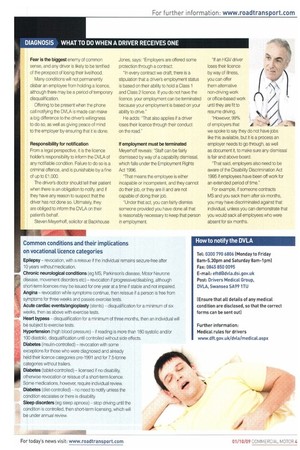DIAGNOSIS WHAT TO DO WHEN A DRIVER RECEIVES ONE
Page 43

If you've noticed an error in this article please click here to report it so we can fix it.
Fear is the biggest enemy of common sense, and any driver is likely to be terrified of the prospect of losing their livelihood.
Many conditions will not permanently disbar an employee from holding a licence, although there may be a period of temporary disqualification.
Offering to be present when the phone call notifying the DVLA is made can make a big difference to the driver's willingness to do so, as well as giving peace of mind to the employer by ensuring that it is done.
Responsibility for notification From a legal perspective, it is the licence holder's responsibility to inform the DVLA of any notifiable condition. Failure to do so is a criminal offence, and is punishable by a fine of up to 21,000.
The driver's doctor should tell their patient when there is an obligation to notify, and if they have any reason to suspect that the driver has not done so. Ultimately, they I are obliged to inform the DVLA on their patient's behalf, Steven Meyerhoff, solicitor at Backhouse Jones, says: 'Employers are offered some protection through a contract.
"In every contract we draft, there is a stipulation that a driver's employment status is based on their ability to hold a Class 1 and Class 2 licence. If you do not have the licence, your employment can be terminated because your employment is based on your ability to drive."
He adds: "That also applies if a driver loses their licence through their conduct on the road."
If employment must be terminated Meyerhoff reveals: "Staff can be fairly dismissed by way of a capability dismissal, which falls under the Employment Rights Act 1996.
"That means the employee is either incapable or incompetent, and they cannot do their job, or they are ill and are not capable of doing their job.
"Under that act, you can fairly dismiss someone provided you have done all that is reasonably necessary to keep that person In employment. "If an HGV driver loses their licence by way of illness, you can offer them alternative non-driving work or office-based work until they are fit to resume driving.
"However, 99% of employers that
/ we spoke to say they do not have jobs like this available, but it is a process ar employer needs to go through, as well as document it, to make sure any dismissal is fair and above board.
'That said, employers also need to be aware of the Disability Discrimination Act 1995 if employees have been off work for an extended period of time."
For example, if someone contracts MS and you sack them after six months, you may have discriminated against that individual, unless you can demonstrate that you would sack all employees who were absent for six months.












































































































































